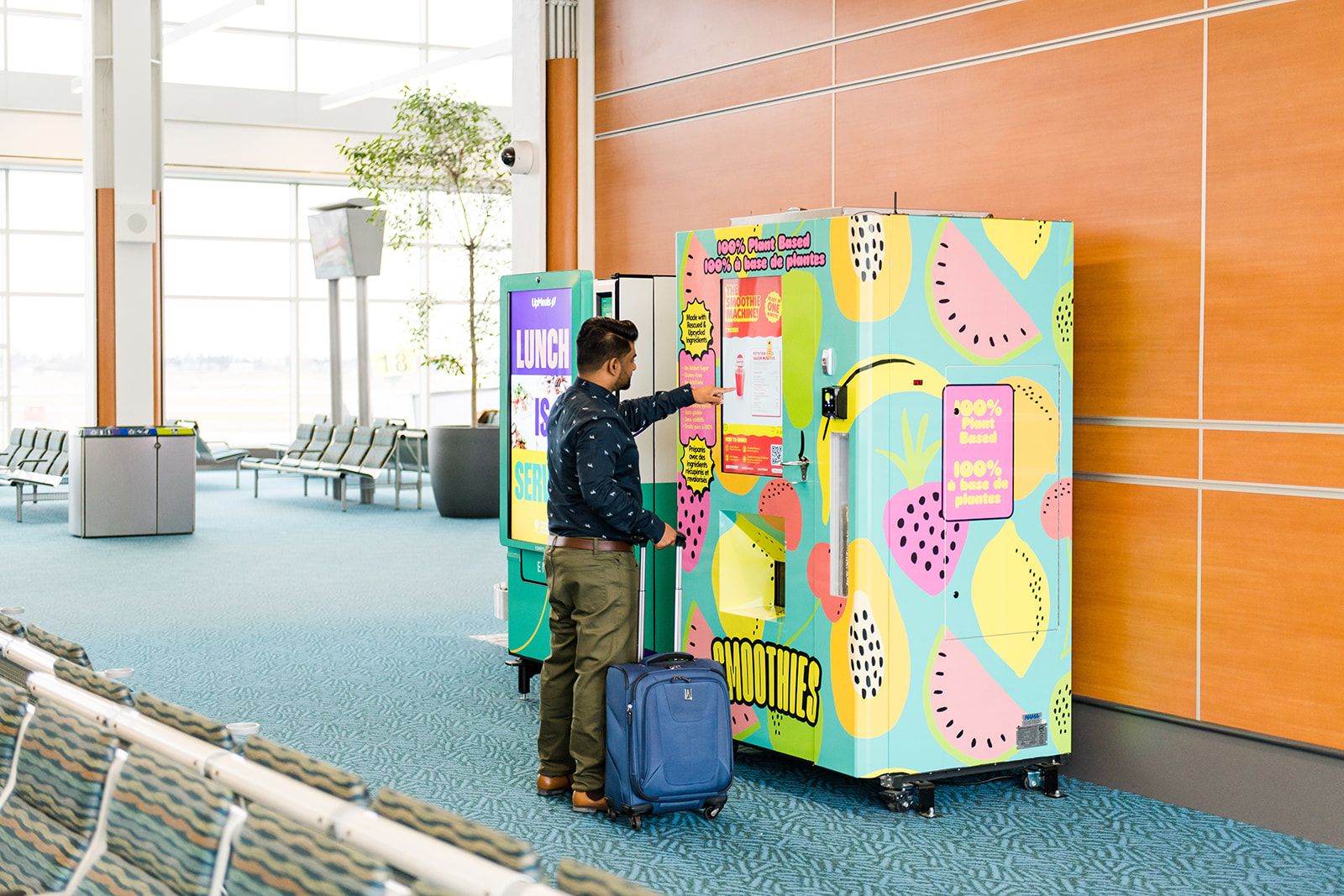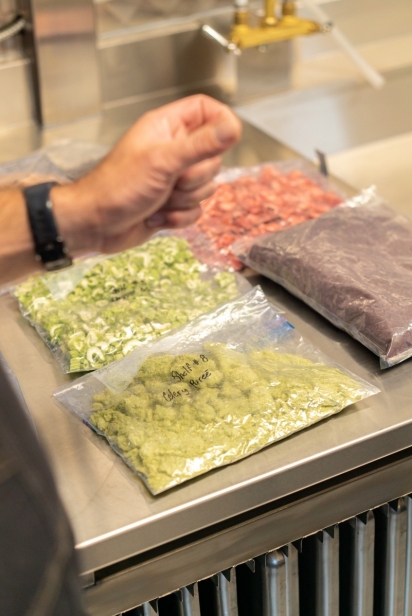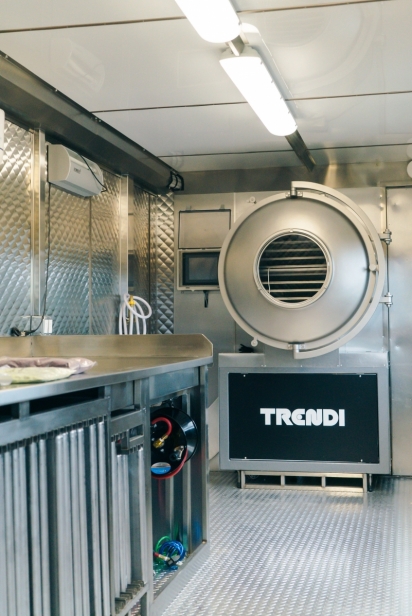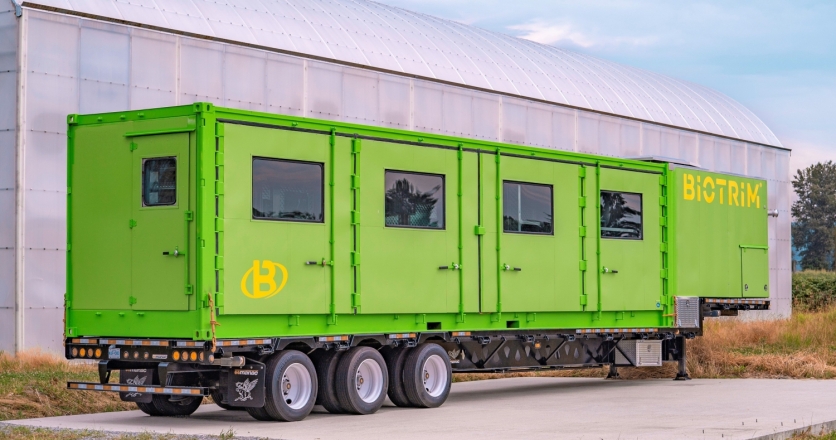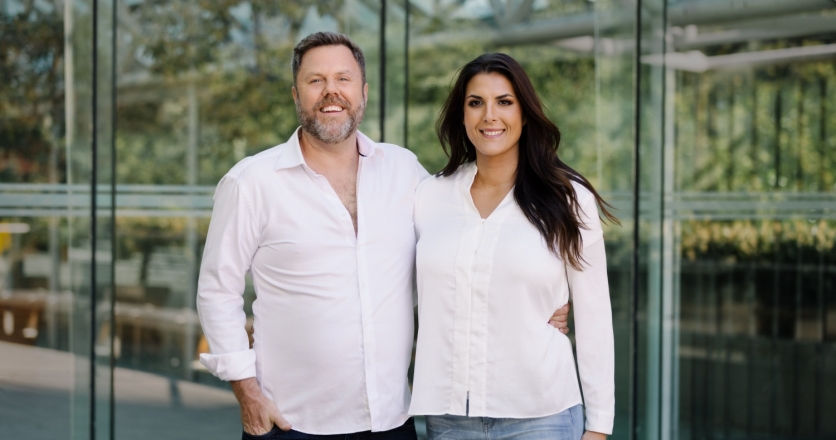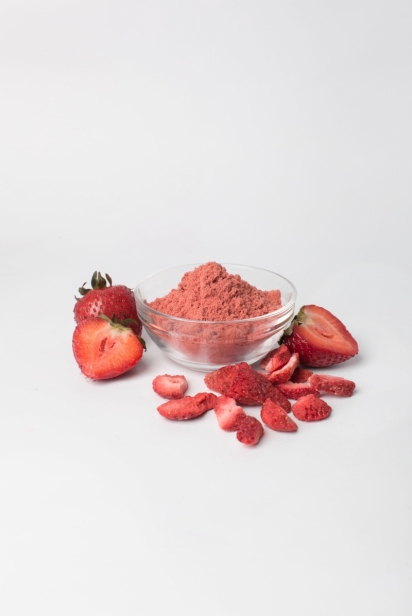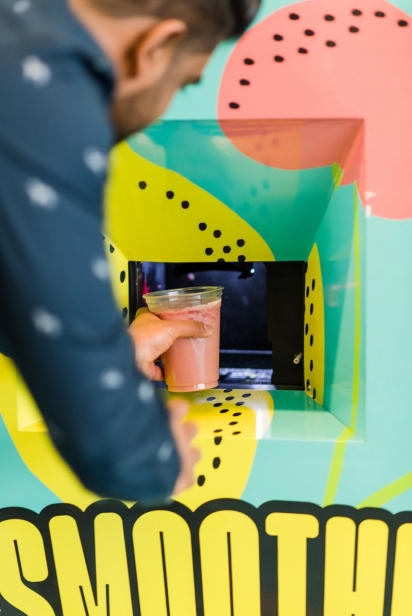One Rotten Banana = One Delicious Smoothie
Remember the old adage waste not, want not? It’s been taken to heart by Burnaby startup TrendiTech Inc., whose aspirations are to rescue and upcycle unused and wasted food at farms, fish processing plants, grocery stores, restaurants or food producers.
One of the primary reasons food is wasted is because it’s not esthetically pleasing to the consumer. Smaller, deformed or engorged fruits and vegetables are considered unsaleable and often discarded at the farm or processing plant, despite their nutritional value and taste being just as good as the perfectly cylindrical product. This contributes to the whopping 40 per cent of organic waste sent to British Columbia landfills annually.
Trendi wants to change these statistics and adjust the public’s attitude toward food waste. Through an automated freeze-drying process, Trendi converts organic materials no longer considered viable for human consumption into shelf-stable powders or purées. These products will, in turn, be sold to the consumer as nutrient-dense food and beverage products, pet food, organic fertilizers or pharmaceuticals.
Dreaming large
The brainchild of Carissa Campeotto and Craig McIntosh, it all began on the back of a dinner napkin in 2018. Their motivation? To determine why so much food is wasted when so many people are hungry? In Canada, one in eight households are impacted by food insecurity. Their solution: use robotics and automation to rescue, revive and redistribute nutritious food.
For McIntosh, Trendi is more than just a great entrepreneurial idea — it’s a reflection of his personal story of survival. His parents divorced before he was two years old. His formative years were split between the dysfunctional home of an alcoholic father and a young single mother. He was disruptive in school and spent time in juvenile detention, but soon became eager to forge his own way and was living on his own by the time he was a teenager. Life was tough and money was scarce.
Along the banks of the St. Lawrence River in Montreal were rows of restaurants. Embarrassed to ask for help, he soon discovered the edible world of dumpsters. Each night, he’d dine on discarded pizza slices, steak or fish and chips.
He says he was surprised at what was thrown out and how well he could eat by surfing through the garbage. Eventually, one of the restaurant chefs found him out there and invited him in to do dishes in exchange for a burger. With food in his belly and the guidance of a mentor, his culinary journey began. As a chef inspired by personal experience, he became a champion of food-waste reduction. It’s a journey that has morphed into Trendi.
In Vancouver, Campeotto grew up in a big Italian family where food was the driver of culture and social gatherings.
“Nonna would craft homemade meatballs every week while my Nonno would stir the pasta sauce for hours until it was ready to serve.” They would never waste food, she says. Everything was appreciated and what wasn’t used, they gave to those in need.
“These are the values Trendi is grounded in — a community centred on food equity, not consumerism.”
The BioTrim
The key to making the dream a reality is Trendi’s behemoth mobile processing unit, aptly named BioTrim. For now, the BioTrim is Trendi’s flagship research and development facility. Pending approval by the Canadian Food Inspection Agency (CFIA), it will go directly to the source of food waste at a farm or processing plant and reclaim and recycle the waste.
Once food waste enters BioTrim, it is automatically cleaned using a self-regulating UV and ozone cleaning system. Moving through the unit, the waste is robotically sliced or diced and transferred to a drying chamber where the water is removed at a low temperature. The freeze-dried powders and purées produced are one tenth the weight and size of the original product while still retaining 97 per cent of its nutrients, flavour and colour.
BioTrim has already received international recognition for its innovation. Last June, Trendi attended the Embedded Technology Convention in Las Vegas, a yearly event showcasing embedded systems such as microprocessors or sensors that are at the heart of many machines and artificial intelligence applications. BioTrim won Embedded’s Innovative Product of the Year. Before this, at the LG NOVA Innovation Festival in San Francisco, Trendi was part of more than 500 startups, industry experts, investors, mentors and influencers collaborating and networking on challenges and topics that impact the future. Trendi again won first place.
The proof in a smoothie
Not satisfied with simply rescuing local food, Campeotto and McIntosh went to one of the most fertile regions of South America. They talked to farmers in Ecuador about their discarded produce and how they could work together to create change. The answer: Turn the local unused and imperfect fruit into shelf-stable unpasteurized purées at certified facilities in Ecuador. Next, import the product to Canada, where an automatic smoothie machine reconstitutes the purée and dispenses it to the consumer.
Sound far-fetched? By January 2023, five smoothie machines were working at Vancouver International Airport’s post-security departure gates B13, B27 and B28 in domestic departures, D67 in international departures and E74 in U.S. departures.
Travellers currently can choose from four options — all gluten-free and vegan with no added sugar or preservatives and all created by Trendi’s president Christine Couvelier, a chef, who has worked with President’s Choice, Maple Leaf Foods and Unilever. Groovy Guava is made with papaya, guava, soursop, apple, lime and turmeric. Berry Breeze features strawberry, raspberry, blackberry and apple. Mango Tango combines banana, mango, passion fruit, ginger and lemon. Finally, Strawburst brings together orange, beet, apple, strawberry and banana. All are automatically dispensed into recyclable cups, with a lid and single-use paper straw.
Megan Sutton, senior communications specialist at YVR, says the machines have been well received by travellers.
Rescuing approximately half a kilogram of fruit and veggies from being wasted with each drink, the smoothies are another way Campeotto says they can educate consumers about upcycled fruits and vegetables.
Spreading the word
We know, says Couvelier, that food waste can be stopped, but it’s going to take education and public awareness. Visitors to Trendi’s website are invited to take the food waste pledge and make use of a treasure trove of resources on how to curb their own food waste. In Canada, $1,766 worth of food is wasted in home kitchens every year. Trendi provides tips on better food storage, a downloadable food waste diary that encourages tracking of home waste with associated cost savings, and recipes that turn leftovers into gourmet dishes.
By reaching out to universities and colleges, Trendi has made connections with the next generation of chefs, bakers and product innovators. At Burnaby’s British Columbia Institute of Technology campus, Trendi has worked with students and faculty connected to the food technology diploma program. It’s a two-year course teaching students the basics of food technology, processing, testing, quality control and analysis.
Instructor Miriam O’Donovan explains how, towards the end of the students’ certification, they develop industrygrade products and associated business plans. During the winter/spring semester of 2023, students were inspired by Trendi’s freeze-dried powders and turned vegetables destined for the garbage into viable shelf-stable edibles.
At the start of the semester, Trendi personnel came to campus and introduced their techniques and the importance of upcycling food waste. Throughout the semester, they returned and offered ongoing mentorship. O’Donovan says that for many students, working with Trendi’s experts opened their eyes to the prolific problem of food waste. The hope, she says, is that they will take what they have learned and incorporate food waste strategies into their careers and lives.
Inspired by her grandparents giving the food they didn’t use to others, Campeotto believes that by taking action and being part of the food-waste conversation, Trendi can and will be part of the global food-waste solution.
TrendiTech Inc.
trendi.com | 1.833.4TRENDI


